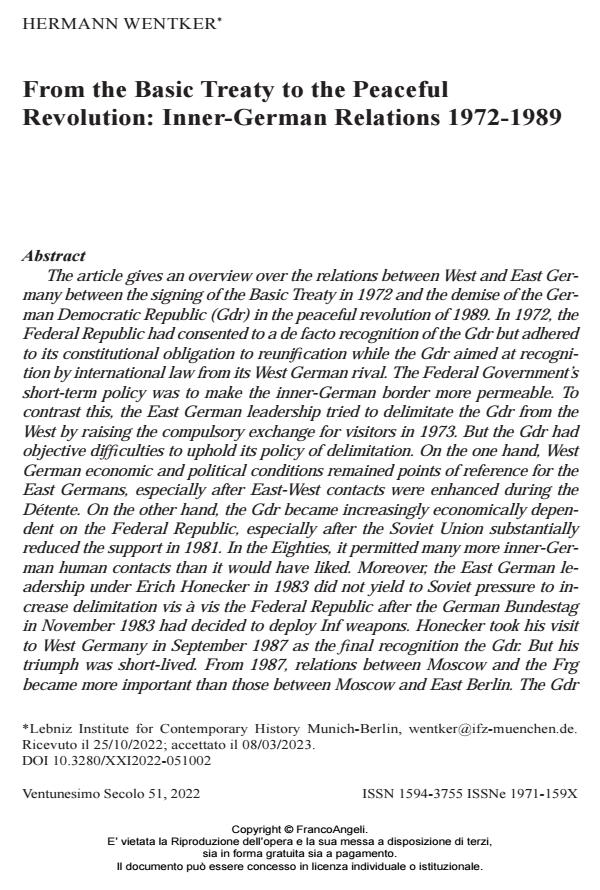From the Basic Treaty to the Peaceful. Revolution: Inner-German Relations 1972-1989
Titolo Rivista VENTUNESIMO SECOLO
Autori/Curatori Hermann Wentker
Anno di pubblicazione 2023 Fascicolo 2022/51
Lingua Inglese Numero pagine 15 P. 9-23 Dimensione file 117 KB
DOI 10.3280/XXI2022-051002
Il DOI è il codice a barre della proprietà intellettuale: per saperne di più
clicca qui
Qui sotto puoi vedere in anteprima la prima pagina di questo articolo.
Se questo articolo ti interessa, lo puoi acquistare (e scaricare in formato pdf) seguendo le facili indicazioni per acquistare il download credit. Acquista Download Credits per scaricare questo Articolo in formato PDF

FrancoAngeli è membro della Publishers International Linking Association, Inc (PILA), associazione indipendente e non profit per facilitare (attraverso i servizi tecnologici implementati da CrossRef.org) l’accesso degli studiosi ai contenuti digitali nelle pubblicazioni professionali e scientifiche.
The article gives an overview over the relations between West and East Ger- many between the signing of the Basic Treaty in 1972 and the demise of the German Democratic Republic (Gdr) in the peaceful revolution of 1989. In 1972, the Federal Republic had consented to a de facto recognition of the Gdr but adhered to its constitutional obligation to reunification while the Gdr aimed at recogni- tion by international law from its West German rival. The Federal Government’s short-term policy was to make the inner-German border more permeable. To contrast this, the East German leadership tried to delimitate the Gdr from the West by raising the compulsory exchange for visitors in 1973. But the Gdr had objective di?culties to uphold its policy of delimitation. On the one hand, West German economic and political conditions remained points of reference for the East Germans, especially after East-West contacts were enhanced during the Détente. On the other hand, the Gdr became increasingly economically depen- dent on the Federal Republic, especially after the Soviet Union substantially reduced the support in 1981. In the Eighties, it permitted many more inner-Ger- man human contacts than it would have liked. Moreover, the East German le- adership under Erich Honecker in 1983 did not yield to Soviet pressure to in- crease delimitation vis à vis the Federal Republic after the German Bundestag in November 1983 had decided to deploy Inf weapons. Honecker took his visit to West Germany in September 1987 as the final recognition the Gdr. But his triumph was short-lived. From 1987, relations between Moscow and the Frg became more important than those between Moscow and East Berlin. The Gdr was threatened by isolation. In the end it was the Gdr’s weakness with regard to economic power, its unwanted political system and the unsolved German question, which led to its defeat in the contest with the Federal Republic.�
Parole chiave:Détente; Basic Treaty; inner-German relations; reunification of Germany; delimitation.
Hermann Wentker, From the Basic Treaty to the Peaceful. Revolution: Inner-German Relations 1972-1989 in "VENTUNESIMO SECOLO" 51/2022, pp 9-23, DOI: 10.3280/XXI2022-051002